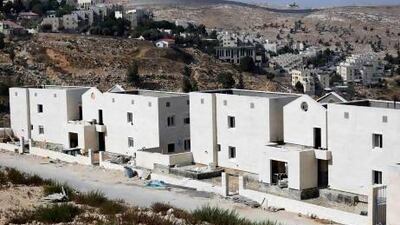RAMALLAH //Today's renewed Palestinian peace talks in Jerusalem were in serious doubt yesterday amid escalating anger over illegal Israeli settlements on occupied land.
Plans for more than 2,000 Jewish settler homes announced on the eve of the talks have infuriated the Palestinians and blindsided the US secretary of state John Kerry, who has spent months of shuttle diplomacy steering both sides back to the negotiating table.
"We have known that there was going to be a continuation of some building in certain places, and I think the Palestinians understand that," Mr Kerry said.
But in a swipe at the Israelis he added: "I think one of the announcements or maybe both of them were outside of that level of expectation, and that's being discussed."
Urging that the talks continue, Mr Kerry said: "Once you have security and borders solved, you have resolved the question of settlements. And so I urge all the parties not to react adversely or to provoke adversely, whichever party may do one or the other in any way.
Nevertheless, the plans for new homes have left the talks on the brink of collapse before they even begin. "Settlement expansion goes against the US administration's pledges and threatens to cause the negotiations' collapse," said Yasser Abed Rabbo, an aide to the Palestinian Authority president Mahmoud Abbas.
Another Palestinian official said senior leaders were discussing whether to attend today's meeting. "I can no longer confirm that we will be going to the talks," he said.
Officials have become wary of sitting down at the negotiating table with representatives of Israel's pro-settler government, led by prime minister Benjamin Netanyahu, whose support of a Palestinian state is questionable. "The frustration here is at a point where no one wants to show up tomorrow," said the official.
The settlements in East Jerusalem and the West Bank, which along with the Gaza Strip are wanted for a Palestinian state, are illegal under international law. Israel's stance threatens a repeat of 2010, when talks broke down over the same issue.
The building plans were announced on Sunday and Monday, just before the expected release in the early hours of this morning of the first batch of 26 Palestinian prisoners freed from Israeli jails as part of the agreement to revive the talks.
Mr Abbas was promised the release of 104 prisoners held since before the 1993 Oslo peace process, in four phases over the nine-month timetable Washington has set for the new round of talks.
The Palestinian chief negotiator Saeb Erakat has underlined the importance of the prisoner release for peace talks to continue.
"We hope to put into effect what we've agreed on … we hope for the release of 104 prisoners," Mr Erekat said.
"There is a clear understanding between us and the Americans and Israelis. Any change will mean the agreement is off the table."
Even the Palestinian president's arch rivals in Hamas, the Islamist movement that controls the Gaza Strip, welcomed the prisoner release.
"Hamas welcomes the release of any hero prisoner from the jails of the occupation but no prisoner would accept conceding any inch of the land of Palestine as a price for his freedom," Khalil Al Hayya, a hardline Hamas official in Gaza, said on Monday.
However, Mr Abbas dropped his long-standing condition for talks that Mr Netanyahu first halt construction on settler units, a decision that has unnerved even the Palestinian leader's closest allies.
He also dropped his demand for Israel to agree that the boundaries that existed before the 1967 Arab-Israeli war were the basis for negotiations.
Housing more than 500,000 Israelis, the settlements are considered a major obstacle to the creation of a Palestinian state.
Israel furthered plans on 15,800 settlement settler homes in the occupied territories from the beginning of the year until June and a further 3,090 from the start of July until August 13, according to figures published last month by the Palestine Liberation Organisation.
* Additional reporting by Agence France-Presse and Reuters
twitter: For breaking news from the Gulf, the Middle East and around the globe follow The National World. Follow us

